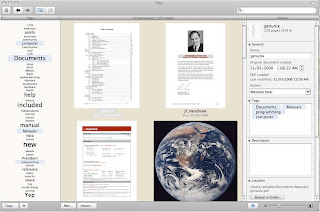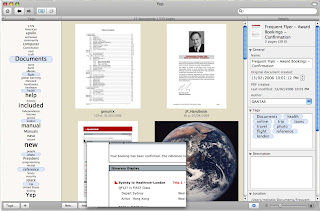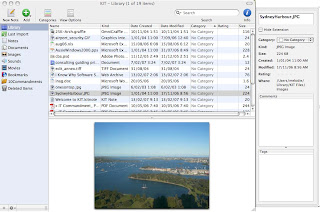Part 1
One of the many wonderful things about Mac OS X is the amazing number of high quality, innovative pieces of software available for the platform. Even better, many of these gems are very reasonably priced, and some are even free. The trick is to find the "perfect" application for your particular needs, and selecting from the bounty on offer can be a serious challenge.
Some weeks ago I started looking at applications that claimed to help the user organize information. What began as a quick look around, in which I intended to make a quick selection and purchase, has snowballed into a survey of a product line up which seems to be growing faster than I can assess the products. There are some fantastic apps on offer, and I have not yet made my final choice, but I have gathered quite a bit of information along the way, and perhaps that information might be useful to someone else....so here it comes.
Let me first state my own background and requirements, so you can understand why I have come to certain conclusions. I am a Unix engineer and I've worked in the IT industry since 1986, doing everything from technical support to presales work. I've installed and configured more computers than I care to remember, and contributed to everything from the Unix FAQ to the Sys Admin Purity Test. It could be that this background makes me a little more demanding than other users. However, I originally trained as a librarian, so I have certain ingrained habits around the storage and management of information. What works for me may not work for you: I'm looking for a very special piece of software, and you may be looking for something quite different.
Years ago, when I still worked in libraries, I used to keep an exercise book in which I would note down witty quotations, book titles, and odd bits of information: more or less what used to be called a commonplace book. And I had a file in which I kept newspaper clippings and comics and such. It could take time to find things, and newsprint deteriorates fast and the edges get tatty. The years passed (queue image of falling calendar pages...), I started working in IT and had regular access to computers. I started keeping PDF'd web pages on my hard drive, and a word processing document of notes and quotes. To do lists moved to my Palm Pilot, along with password management. This reduced the amount of paper, but still I generally couldn't find things in a hurry.
Then I got a Mac (11th March 2004, oh frabjous day), and my life got instantly better. I tested various applications, and settled on DEVONthink and Circus Ponies Notebook. I use DEVONthink to store big technical documents, most of which are in PDF format, but some are Word documents. Some of these documents run to hundreds of pages, and there are over 3000 documents in my DEVONthink database. Notebook I use for random notes, to do lists, and other random scratchings. Book marks I kept in my brower's bookmarks.html. And I still seemed to have PDFs of web pages scattered about the place.
Then I discovered del.icio.us . This is a wonderful service, and I almost never store local bookmarks any more. Three cheers for del.icio.us. And then I found furl , and I started building up an archive of web pages. If you haven't tried these two sites, let me recommend them to you here and now.
But the day came when del.icio.us had a glitch, and I couldn't reach my book marks for a few hours (it came back, and I breathed again). And then there was an instance where I knew that the information I needed was archived in my furl account, but I had no internet connection, so I couldn't reach the archive.
I began looking around for something better. I still love del.icio.us and furl, but I need more.
Let me try and define the gap (software developers, please take note: this is a specification).
The application that I am looking for is to handle the bits and pieces of information that I might want on another day. It is a cross between a notepad, filing cabinet and commonplace book: it must be prepared to gulp down web pages, text files, random notes, smallish documents in various formats, pictures and anything else that comes along. Anything larger than about 50 pages is probably going to be stored in DevonThink, because it is likely to be a manual or a specification: I have specific strategies for managing documents with a lot of technical content. Customer documentation I store completely separately, for reasons of security. What I need a bit bucket that can keep everything else together and retrieve things on demand.
The application needs to provide me with the following functionality (note: the desired features reflect the way that I work - your list will probably be different).
The application must support some sort of automation, either through shell script or AppleScript. If I can't interface to the application on the command line, I don't want it.
The application must store the captured material within a repository that it controls. I don't care if that is a certain area of the file system or a database, but I don't want links to files in unpredictable places on my hard disk. I need to be certain which files the app "owns", so I don't change those files outside the application.
The application must handle as many file formats as possible, and make them available in preview mode. It must be able to store Word documents and, if at all possible, Open Office documents.
The application must make it easy to get information into it: anything that requires me to save something and then import it in a separate step is going to annoy me very quickly.
The application must save entire web pages, not just URLs. It absolutely must not rely on the presence of a internet connection to retrieve information. If I'm working in the depths of some data centre, with no internet access (this is extremely common), I need all my files on my laptop's hard drive. Very few customers will allow visiting engineers to just plug a laptop into the corporate network, and if I'm working on production servers, the chances are that there are multiple layers of firewalls in place, carefully blocking all access to the internet anyway. If I don't have the file I want on my laptop, I don't have access to it until I leave the data centre.
The application must start and stop quickly, and not impose an absurd overhead on the running system.
The application must enable me to get files back out of it in the same format that they went in. I'll be using the application to store originals of documents that I have created, but I may want to make copies that I can modify to suit particular customers/colleagues/whatever.
Ideally, it will be easy to manually copy the repository onto a separate machine: I have an inherent distrust of syncing data through external services, because I handle a lot of confidential information. It's all about control.
The application must support some robust form of encryption at the record level - I do not want the over head of encrypting non-sensitive data.
The application must support tagging.
The application must work with Firefox - I don't generally use Safari.
And so I started in on evaluating software. I started with Yojimbo (for no particular reason, I happened upon it first). But once I started looking around, I found a lot of competing software. The list (so far) is:
DEVONthink Pro
Circus Ponies Notebook
Yojimbo
Yep
KIT
Mori
MacJournal
EagleFiler
Tinderbox
Notemind
Voodoo Pad
Journler
SOHO Notes
and there may be more. If I've missed an application that should be on that list, please tell me (melodie.neal(AT)gmail.com). Over the next couple of posts, I'll try to provide a quick run down on each application, highlighting what I see as the pluses and minuses. I'm trying to fit this around my real job, so this may not be quick.
Note to all readers, especially developers: I've noticed in some of the support forums and developer's blogs that there is a fair bit of passion in some of the communities. That's normal, but let's try to keep things in perspective: the least suggestion that application A is better or worse in some way than application B should not generate a firestorm of abuse. I have read one or two posts that I considered extremely childish, particularly posts from developers. Decades of working with developers has taught me how sensitive you are as a group, and I realise that criticism of a piece of software over which you have probably laboured for many nights must grate. However, throwing a toys-out-of-pram tantrum does not create a good impression on the paying customers. Accept that other people see things differently to you, and have different requirements, and see what you can learn from those differences (actually, that may be the formula for world peace, so let's just try a local implementation and see how we go).
If you feel that I have been unfair to your application/baby, or have misunderstood it or overlooked some particularly charming feature, please tell me nicely. I'm happy to revisit anything that needs another look, and to make corrections where needed.
Without further ado, I'm going to start with the apps that got ruled out early:
Yep Visually this is very appealing, and it may develop into something really special in the future, but it's not there yet.

The only thing YEP can store is PDFs and images, so it won't work for me. I do like some aspects of the interface, particularly the ability to mouse over a document to get a magnified view, like this:

which lets you decide if the document is the one you want before you open it (which happens in the document's defined default viewer. Before you purchase YEP, read the reviews on Versiontracker.
Notemind looks really promising, but I can't assess it properly because the "demo license" does not allow you to save when you close the application, so I can't judge start/stop speed. Notemind only handles Notes, To-do lists, Web sites, PDFs, Images and Audio. It won't take a Word or Open Office documents, which is a big problem for me. It will take Photoshop files as images (nice, not all the apps tried could handle Photoshop). It also has an tendency to quit unexpectedly.
KIT shows promise. The interface is relatively uncluttered:

and it supports a good range of file formats. It will import and preview Microsoft Word files. It will import Open Office documents, but it can't preview them. It can store and preview TIFF, JPG, GIF and PSD files. It imported an Omnigraffle diagram, but couldn't preview it (and it didn't recognise the .graffle as an image, it filed it as a document). It imported Excel and Power Point files, but couldn't preview them. KIT also supports importing folders of documents in one go (not all apps do this rather basic thing). KIT supports tagging, stores documents it controls in a dedicated directory, and it you can get documents back in the same format that they went in. But it has no support for AppleScript or shell script, so alas, it is not for me.
And that's it for this post, more in a few days.
